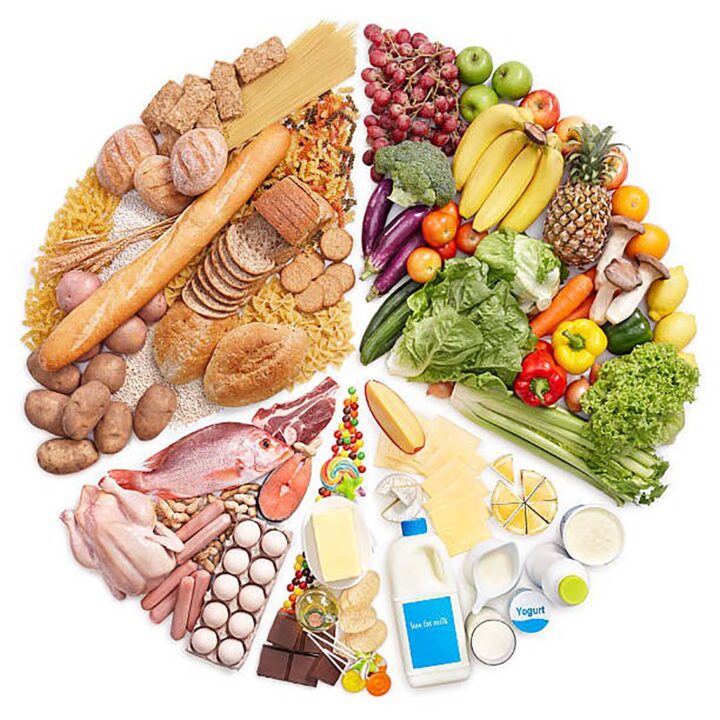Most Myanmar people have heard the saying, “Kamma – deeds, words, and thoughts -, mind, season, and nutrition (ကံ၊ စိတ်၊ ဉတု၊ အဟာရ).” These factors are essential for maintaining good health, with nutrition being the most important. If any of these factors are imbalanced, it can affect one’s health and even lead to death. The saying, “Physical form is guarded by nutrition,” emphasizes the crucial role of nutrition.
In today’s information age, nutrition knowledge is widely accessible. You can find information on nutrition through radio, TV, newspapers, magazines, and the internet. A person who pays attention can gain nearly as much knowledge about nutrition as a medical professional.
Food can be categorized in various ways: liked or disliked, proper or improper, and seasonal or unseasonal. These categories are easy to understand even without medical training. Most people know their likes and dislikes; they tend to eat more of what they like and less of what they dislike. For example, someone might eat more cake if they enjoy sweets while avoiding vegetables they dislike. Seasonal food refers to what is naturally available in the current season, and everyone should consume it in moderation for its medicinal benefits. For instance, certain fruits are more nutritious and beneficial during their natural season.
Advancements in technology have allowed for the production of crops and parthenocarpic fruits year-round. In large cities like Yangon and Mandalay, a wide variety of foods are available at all times. This accessibility makes it easy for people to get the nutrients they need, but it also poses the risk of overconsumption and unhealthy eating habits.
Understanding Proper and Improper Food
It’s crucial to distinguish between proper and improper food. Proper food keeps the body healthy, while improper food can pose severe health risks or even be life-threatening. For example, placing salt on normal skin causes no pain, but placing it on a cut result in excruciating pain. Similarly, eating improper food can cause significant harm. Unfortunately, some people’s favourite foods might be improper for their health.
Indigenous Medicine classifies food into six tastes: sweet, sour, salty, hot, acrid, and bitter (ချို၊ ချဉ်၊ ငန်၊ စပ်၊ ဖန်၊ ခါး). Western medicine, on the other hand, categorizes food as carbohydrates, proteins, fats, vitamins, minerals, water, and fibres. The concept of nutrition suggests that one should consume all tastes in moderation, not favouring one taste excessively. For example, someone who likes sweets should not eat only sweet foods; they should also consume other tastes. Similarly, in Western nutrition, one should not eat only meat but also include vitamins, minerals, and fibres in their diet.
The role of nutrition in health is profound. Good food is essential for average growth and development, promoting health and preventing diseases. The human body is like a machine that needs food to generate energy. The discovery of vitamins revolutionized the science of nutrition, leading to significant advances in understanding their importance.
Global Nutrition Concerns
Nutrition is becoming increasingly important globally, with malnutrition affecting many regions and influencing various clinical disorders. In developed countries, overnutrition is more common than undernutrition, leading to health hazards such as increased mortality and higher disease incidence. Thus, global nutrition is a major international concern.
The terms “food” and “nutrition” are sometimes used interchangeably, but they are different. Food comprises various substances in different quantities, while nutrition is the process by which the body utilizes food for nourishment. Despite these differences, there is a Myanmar saying, “Food is also medicine; medicine is also food (အစာလည်းဆေး၊ ဆေးလည်းအစာ)”, reflecting the belief that food and medicine are interconnected. This saying has been passed down through generations and is still relevant today.
Practical Advice for Healthy Eating
To summarize, it is essential to consider both modern nutritional knowledge and traditional wisdom. One of my favourite pieces of advice about food comes from Sayagyi U Htut, a former headmaster and member of the Council of Indigenous Medicine in Myanmar. At over 80 years old, he remains healthy and active, attending annual ceremonies at our school. On the 25th anniversary of the ex-teachers homage ceremony, he shared valuable advice:
“My students, you are also getting old. Take good care of your health. I’ll give you all a present associated with the food you eat. I’ve been practising it up to now. It is nothing, but if you are going to eat food, eat only when you are hungry; eat what is proper with your health and eat less of what you wish for.”
This advice emphasizes three simple yet profound principles for maintaining good health: eat only when hungry, eat what is proper, and eat less. These guidelines can help individuals make better food choices and improve their overall well-being.
Delving Deeper into Nutritional Knowledge
It’s essential to understand the specific roles and benefits of different food categories to delve deeper into nutritional knowledge. Carbohydrates are the body’s primary energy source. Foods rich in carbohydrates include rice, bread, and pasta. While carbohydrates are crucial for energy, consuming them in excess can lead to weight gain and related health issues like diabetes.
Proteins are vital for building and repairing tissues. They are found in foods such as meat, fish, eggs, and legumes. Proteins are essential for muscle growth and repair, making them crucial for athletes and those recovering from injuries.
Fats, often misunderstood, are necessary for the body. They provide energy, help in the absorption of certain vitamins, and protect organs. However, it’s important to differentiate between healthy fats (found in avocados, nuts, and olive oil) and unhealthy fats (found in processed foods and trans fats).
Vitamins and minerals are required in small quantities but are vital for the proper functioning of the body. For instance, vitamin C boosts the immune system, while calcium is crucial for bone health. A balanced diet that includes a variety of fruits and vegetables can provide the necessary vitamins and minerals.
Water is another crucial component of nutrition. It makes up a significant portion of the human body and is essential for maintaining bodily functions. Staying hydrated helps digestion, nutrient absorption, and regulating body temperature.
Fiber in fruits, vegetables, and whole grains is important for digestive health. It helps prevent constipation and reduces the risk of developing heart disease, diabetes, and colorectal cancer.
The Importance of Balanced Diet and Portion Control
A balanced diet that includes a variety of foods from all these categories is essential for maintaining good health. It’s not just about what you eat but also about how much you eat. Portion control is crucial in preventing overnutrition, which can lead to obesity and other health problems. Moderate eating ensures you get the necessary nutrients without consuming excess calories.
Mindful eating is another important aspect of maintaining a healthy diet. It involves paying attention to what and how much you eat, savouring each bite, and recognizing the body’s hunger and fullness signals. This practice can help prevent overeating and promote a healthier relationship with food.
The Role of Traditional Foods in Modern Nutrition
Incorporating traditional foods into a modern diet can offer numerous health benefits. Traditional diets often include a variety of whole, unprocessed foods that are rich in nutrients. For instance, traditional Myanmar dishes often feature a variety of vegetables, herbs, and spices, which are packed with vitamins and antioxidants.
Moreover, traditional eating practices, such as eating seasonally and locally, can enhance the nutritional value of the diet. Seasonal foods are often fresher and more nutritious, while local foods support the local economy and reduce the carbon footprint associated with transporting food over long distances.
Addressing Common Nutritional Myths
There are many myths and misconceptions about nutrition that can lead to unhealthy eating habits. One common myth is that all fats are bad. As mentioned earlier, healthy fats are essential for the body and should be included in a balanced diet.
Another myth is that carbohydrates should be completely avoided for weight loss. While it’s true that reducing the intake of refined carbohydrates can aid in weight loss, whole grains and other complex carbohydrates are important sources of energy and should not be entirely eliminated.
It’s also a misconception that skipping meals can help with weight loss. In reality, skipping meals can lead to overeating later in the day and can disrupt the body’s metabolism. It’s better to eat regular, balanced meals throughout the day to maintain energy levels and promote a healthy metabolism.
The Psychological Aspect of Eating
Eating is not just a physical act; it also has a psychological component. Emotional eating, where individuals eat in response to emotions rather than hunger, is a common issue that can lead to unhealthy eating patterns and weight gain. Stress, boredom, sadness, and other emotions can trigger overeating or the consumption of unhealthy comfort foods.
To address emotional eating, it’s important to develop healthy coping mechanisms for dealing with emotions. This might include engaging in physical activity, practising mindfulness and meditation, or seeking support from friends, family, or a mental health professional.
Nutrition for Special Populations
Different populations have unique nutritional needs. For example, children and adolescents require more nutrients to support growth and development. Pregnant women need additional nutrients to support the health of both the mother and the developing fetus. Older adults may need fewer calories but more of certain nutrients like calcium and vitamin D to maintain bone health.
Athletes have higher energy and protein requirements to support their intense physical activity and muscle repair. People with certain medical conditions, such as diabetes or heart disease, may need to follow specific dietary guidelines to manage their conditions effectively.
The Role of Nutrition Education
Nutrition education is crucial for helping people make informed food choices. Schools, community programs, and healthcare providers play an important role in teaching individuals about the importance of nutrition and how to create a balanced diet. Providing practical tips and resources can empower people to make healthier choices and improve their overall well-being.
All in all, good nutrition is fundamental to maintaining health and well-being. By eating only when hungry, eating what is proper, and eating less, individuals can develop healthier eating habits and improve their overall quality of life. It’s important to consider.
(This article is dedicated to the memory of my esteemed late teacher, Sayagyi U Htut)














